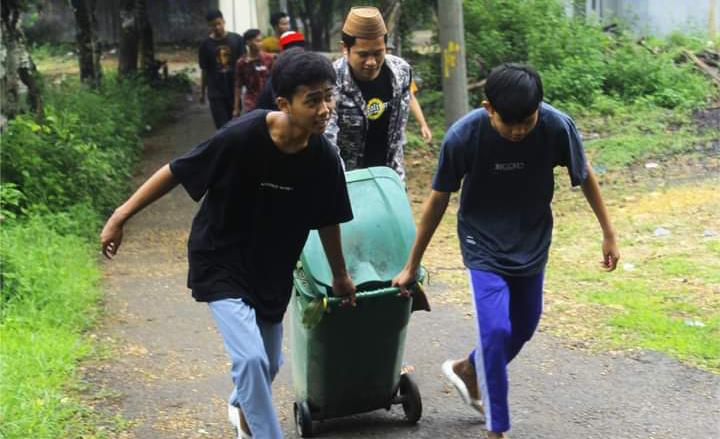Before delving further into ecology, I’d like to recount the heroic action of five young men who named themselves the Pandawara Group. ‘Panda,’ meaning five youths, and ‘Wara,’ signifying good news—five youths bearing good tidings.
‘Good news for whom?’ I confidently reply: good news for all of us humans, without exception, and for every creature inhabiting this earth. While this might seem exaggerated, I have strong reasons to assert this.

As long as we remain loyal to the TikTok app, the heroic actions of the Pandawara Group incessantly flooded our TikTok feeds, prompting us to wonder: what compelled them to clean up so much litter? Various responses and comments emerged, ranging from ambitions for followers and viewers to derision, accusing them of deceiving the public or misleading society.
From my observations, perhaps only they truly understand how to navigate life’s dynamics and its problems without sinking into a pit that makes us forget the importance of maintaining good relations with humans, animals, and, of course, nature.
Indirectly, the Pandawara Group has compelled us to be sensitive and understand that ‘our earth’ is not in a good state. This understanding goes beyond mere acknowledgment, emphasizing the actual steps we must take: caring for nature!
Honestly, every time I witness the Pandawara Group’s actions spread across social media, it becomes easy for me to believe in the words of Allah: that all the earth’s damage, whether on land or at sea, is the result of human actions (Surah Ar-Rum: 41).
While generally, environmental damage can be attributed to two factors: firstly, damage caused by nature itself, such as natural disasters beyond human control. Secondly, environmental damage caused directly by human actions.
The Mandate to Preserve the Earth
Humanity, as stewards of the earth (khalīfah fī al-arḍ), undoubtedly carries the responsibility to nurture and safeguard the earth. This duty is evident when Allah mentions the process of creating humans from the earth in Surah Hud, verse 61:
“To Thamud [We sent] their brother Salih. He said, ‘O my people, worship Allah; you have no deity other than Him. He has produced you from the earth and settled you in it. So, ask forgiveness of Him and then repent to Him. Indeed, my Lord is near and responsive.'” (Surah Hud: 61)
Apart from the creation of humans from the earth, Allah also commands humans to enhance what they were created from. The commentator Ṭanṭawī Jauharī (1862-1940), in his commentary al-Jawāhir fī Tafsīr al-Qur’ān al-Karīm, interprets the above verse as an explanation of humanity’s existence to preserve nature or the environment (wasta’marakum fīhā). In line with this, Ibn Kathir also emphasizes in his book that humans must initiate goodness and act as custodians of the environment.
In addition to verse 61 of Surah Hud, numerous verses in the Quran emphasize the importance of caring for the earth (the environment). For instance, in Surah Al-A’raf, verse 56: “And cause not corruption upon the earth.” Through these two verses, it is evident that humans have the duty to care for the environment rather than cause harm.
Santri and Efforts to Preserve the Earth
As someone who has been a santri from a young age, I often speculate on how Santri will eventually become the foremost entity in Indonesia, without a shadow of doubt. I imagine that only Santri can address and find solutions to all the issues plaguing our nation, be it conflicts in the name of religion, politics, social concerns, health, or especially the environment. Whatever the problem, Santri are the solution.
Discussing waste issues and ecological concerns, I suddenly reminisce about my first pesantren, where I acquired knowledge during my high school years. Yes, a pesantren nestled deep in Sumenep, specifically Annuqayah Guluk-Guluk pesantren.
It was there that I first became intimately connected with nature, understanding how to nurture and maintain the environment. I vividly recall being reprimanded by the security staff for buying rice wrapped in plastic. Initially trivial, I wondered what the issue was, but after being chastised, I sought an explanation from a senior. Astonishingly, after my explanation, the senior just chuckled without guilt. Eventually, after a lengthy explanation, I understood the detrimental impact of plastic wrapping on the environment or nature. The senior said, ‘The impact may not be immediate, but just wait.’
Imagine the sheer volume of plastic waste generated daily if every santri who bought rice used plastic wrapping. Considering Annuqayah’s santri data during my final year, which reached over 13,000 across all branches, if each santri consumed two meals daily with plastic wrapping, the amount of plastic waste produced daily would be immense.
This made me realize that the prohibition against using plastic wrapping for meals, although seemingly trivial, is not an easy matter. It requires heightened awareness to transform it into a habit. Yet, even this seemingly small effort demonstrates Santri’ concern for nature and the environment.
Now, I find myself in a pesantren environment not much different from my previous one. Similar in spirit, emphasizing the collective consciousness of caring for and nurturing the environment. By prohibiting Santri from presenting meals with any trace of plastic during activities, Pondok Pesantren Al-Anwar 3 Sarang Rembang—M. Faizi termed it in his book—is making tangible efforts not to harm the earth through dining practices.
These two pesantrens merely exemplify how pesantrens are now responding to the ever-increasing garbage issue. Besides these, it’s certain that many other pesantrens share the same spirit in addressing environmental problems, especially waste.
Because, regardless, environmental damage due to waste is a consequence of human actions and should not be allowed to persist. Daring to forego using wrapping for rice purchases is sufficient evidence of our concern for the environment. Let us engage in an ecological jihad together, Santri ready to lend a hand! Wallahu A’lam.
Translated from here.







